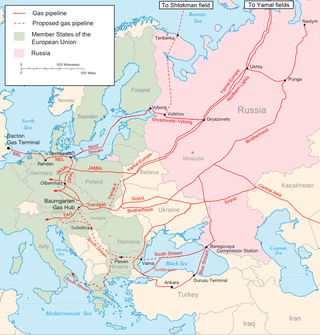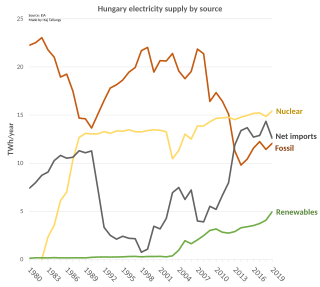An energy crisis or energy shortage is any significant bottleneck in the supply of energy resources to an economy. In literature, it often refers to one of the energy sources used at a certain time and place, in particular, those that supply national electricity grids or those used as fuel in industrial development. Population growth has led to a surge in the global demand for energy in recent years. In the 2000s, this new demand – together with Middle East tension, the falling value of the US dollar, dwindling oil reserves, concerns over peak oil, and oil price speculation – triggered the 2000s energy crisis, which saw the price of oil reach an all-time high of $147.30 per barrel ($926/m3) in 2008.

PJSC Gazprom is a Russian majority state-owned multinational energy corporation headquartered in the Lakhta Center in Saint Petersburg. As of 2019, with sales over $120 billion, it was, until 2023, ranked as the largest publicly listed natural gas company in the world and the largest company in Russia by revenue. In the 2020 Forbes Global 2000, Gazprom was ranked as the 32nd largest public company in the world. The Gazprom name is a contraction of the Russian words gazovaya promyshlennost. In January 2022, Gazprom displaced Sberbank from the first place in the list of the largest companies in Russia by market capitalization. In 2022, the company's revenue amounted to 8 trillion rubles. In 2023, the company is delisted from international markets, and continues substantial constriction in its operational results.

The Russia–Ukraine gas disputes refer to a number of disputes between Ukrainian oil and gas company Naftogaz Ukrayiny and Russian gas supplier Gazprom over natural gas supplies, prices, and debts. These disputes have grown beyond simple business disputes into transnational political issues—involving political leaders from several countries—that threaten natural gas supplies in numerous European countries dependent on natural gas imports from Russian suppliers, which are transported through Ukraine. Russia provides approximately a quarter of the natural gas consumed in the European Union; approximately 80% of those exports travel through pipelines across Ukrainian soil prior to arriving in the EU.

Energy in Bulgaria is among the most important sectors of the national economy and encompasses energy and electricity production, consumption and transportation in Bulgaria. The national energy policy is implemented by the National Assembly and the Government of Bulgaria, conducted by the Ministry of Energy and regulated by the Energy and Water Regulatory Commission. The completely state-owned company Bulgarian Energy Holding owns subsidiaries operating in different energy sectors, including electricity: Kozloduy Nuclear Power Plant, Maritsa Iztok 2 Thermal Power Plant, NEK EAD and Elektroenergien sistemen operator (ESO); natural gas: Bulgargaz and Bulgartransgaz; coal mining: Maritsa Iztok Mines. In Bulgaria, energy prices for households are state-controlled, while commercial electricity prices are determined by the market.

Russia's energy policy is presented in the government's Energy Strategy document, first approved in 2000, which sets out the government's policy to 2020. The Energy Strategy outlines several key priorities: increased energy efficiency, reducing the impact on the environment, sustainable development, energy development and technological development, as well as improved effectiveness and competitiveness. Russia's greenhouse gas emissions are large because of its energy policy. Russia is rich in natural energy resources and is one of the world's energy superpowers. Russia is the world's leading net energy exporter, and was a major supplier to the European Union until the Russian invasion of Ukraine. Russia has signed and ratified the Kyoto Protocol and Paris Agreement. Numerous scholars posit that Russia uses its energy exports as a foreign policy instrument towards other countries.

The 2008 Central Asia energy crisis was an energy shortage in Central Asia, which, combined with the severe weather of the 2007-08 winter and high prices for food and fuel, caused considerable hardship for many. The abnormally cold weather pushed demand up for electricity, exacerbating the crisis. The situation was most dire in Tajikistan. An international appeal was made by the United Nations, NGOs, and the Red Cross and Red Crescent for around US$25 million to assist the government. At the time, The UN warned that millions face starvation during the 2008-09 winter.

Energy in Finland describes energy and electricity production, consumption and import in Finland. Energy policy of Finland describes the politics of Finland related to energy. Electricity sector in Finland is the main article regarding electricity in Finland.

Energy in Armenia is mostly from natural gas. Armenia has no proven reserves of oil or natural gas and currently imports most of its gas from Russia. The Iran-Armenia Natural Gas Pipeline has the capacity to equal imports from Russia.

In 2009, Russian natural gas company Gazprom refused to conclude a supply contract unless Ukrainian gas company Naftogaz paid its accumulating debts for previous gas supplies. The dispute began in the closing weeks of 2008 with a series of failed negotiations, and on January 1, 2009 Russia cut off gas supplies to Ukraine. On January 7 the dispute turned to crisis when all Russian gas flows through Ukraine were halted for 13 days, completely cutting off supplies to Southeastern Europe, most of which depends on Russian gas, and partially to other European countries.

Russia supplies a significant volume of fossil fuels to other European countries. In 2021, it was the largest exporter of oil and natural gas to the European Union, (90%) and 40% of gas consumed in the EU came from Russia.

The 2004 Russia–Belarus energy dispute was a commercial and diplomatic dispute between Russia and Belarus that escalated in January 2004. Close relations between the two countries and willingness for political integration had made it possible for Belarus to purchase gas from Russia at heavily discounted prices. In the late 1990s, Russian foreign policy shifted away from geopolitics and became more pragmatic and economical, especially after the inauguration of President Vladimir Putin. As a result, Gazprom moved to ensure the reliability of gas transits to Europe by attempting to establish control over the Belarusian transit network. Belarus initially agreed to sell 50% of the network, but after disagreements over price, Belarus severed the contract. Gazprom announced price rises, and after Belarus refused, Gazprom ceased to import gas to Belarus on 1 January 2004. Belarus compensated by siphoning from gas meant for transit to Europe, which on 18 February resulted in Gazprom completely shutting off the supply to Belarus. Other companies supplied Belarus on short-term contracts until June 2004, when a new contract with Gazprom was finally signed.

Energy in Austria describes energy and electricity production, consumption and import in Austria. Austria is very reliant on hydro as an energy source, supported by imported oil and natural gas supplies. It is planned by 2030 to become 100% electricity supplied by renewable sources, primarily hydro, wind and solar.

Energy in Moldova describes energy and electricity production, consumption and import in Moldova.

Energy in Hungary describes energy and electricity production, consumption and import in Hungary. Energy policy of Hungary describes the politics of Hungary related to energy.

In 2021 Russia was the world's second-largest producer of natural gas, producing an estimated 701 billion cubic meters (bcm) of gas a year, and the world's largest natural gas exporter, shipping an estimated 250 bcm a year. In 2022 the export market collapsed, following the Russian invasion of Ukraine and Russia reducing exports after countries refused to pay in rubles.

The energy crisis in Armenia, popularly known as the dark and cold years, refers to the energy crisis in Armenia during the 1990s, when the newly independent Armenia's population lived in shortage of energy and basic consumer goods. Although it only lasted 3–4 years, it left a deep impact and impression. Local people have dubbed the years from 1992 to 1995 in different ways, such as "hungry", "cold", and "bad", but the most common title used is "the dark".

Fossil gas supplies over a quarter of Turkey's energy. The country consumes 50 to 60 billion cubic metres of this natural gas each year, nearly all of which is imported. A large gas field in the Black Sea however started production in 2023.

The Russia–EU gas dispute flared up in March 2022 following the invasion of Ukraine on 24 February 2022. Russia and the major EU countries clashed over the issue of payment for natural gas pipelined to Europe by Russia's Gazprom, amidst sanctions on Russia that were expanded in response to Russia's 2022 invasion of Ukraine. In June, Russia cut the flow of gas to Germany by more than half, and in September of that year it stopped it altogether. On 26 September 2022, three of the four pipes of the Nord Stream 1 and 2 gas pipelines ruptured with evidence of sabotage.
The 2021–2022 global energy crisis has caused varying effects in different parts of the world.
Starting in late 2022, Moldova suffered an energy crisis, the worst since its independence. Hugely influenced by the Russian invasion of Ukraine, caused when Russia's Gazprom reduced supplies.
















